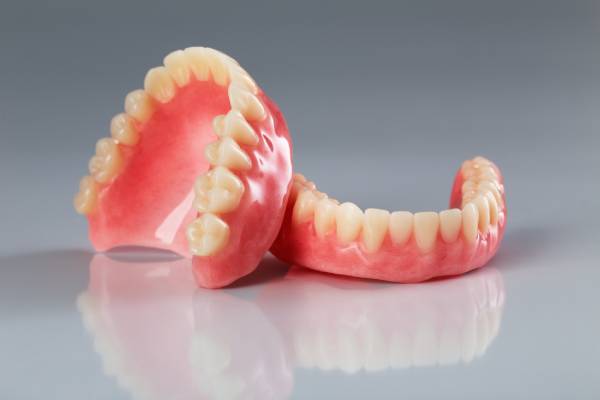
If you have complete or partial dentures, you know that they’re important for your quality of life. While they may not be exactly like natural teeth, proper care for your dentures is just as important as caring for your original teeth! In fact, if you take care of your dentures, they’ll look better and last longer.
Knowing how to properly clean your dentures is a valuable part of having them. You can avoid several notable issues, and keep your mouth healthier, through regular care. Read on to learn more about how to take care of your dentures!
Steps for Proper Denture Care
Keeping your dentures clean and good condition is not particularly difficult or time consuming, but it is very important. The basic steps for proper denture care include:
Handle with Care
One of the most common issues we hear patients have with dentures isn’t with wearing or cleaning them; it’s about dropping or damaging them! You’ll be spending a lot of time with your dentures, so it’s not surprising that eventually you may accidentally drop them or knock them off a table.
It is important to avoid accidentally dropping your dentures! While they’re made to be resilient, they can still suffer damage from an accident. It’s possible to crack part of your dentures or even break the entire set.
To prevent denture damage, always stand over a folded towel or a full sink of water when you handle your dentures. You should also make sure any time you have them out of your mouth is a distraction-free time. Make it something you do mindfully and you’re far less likely to make a mistake. It can be hard in practice, especially as you become more comfortable with your dentures.
In the end, treating your dentures like the valuable part of you they are will lead to an easier time managing them!
Brush and Rinse Daily
One habit you must carry over from your natural teeth to your dentures is regular brushing. While you may think it’s unnecessary for artificial teeth, bacteria can be harmful to you whether or not you have to worry about enamel. Remember, bacteria in your mouth isn’t only an issue for your teeth! They’ll spread from your teeth to your gums, where they can cause gum disease or exacerbate existing disease. Periodontal disease has a wide variety of side effects, which can be problematic if combined with other health issues.
Brushing regularly as if they were your natural teeth (twice per day, for about two minutes) will help remove food particles and plaque. This keeps them cleaner and reduces gum disease risks for you.
Brushing your dentures will also help prevent the development of permanent stains. From coffee to certain foods, tannins and other chemicals will still be able to leave behind unsightly stains on dentures just like natural teeth. The better you brush, the better your dentures will look.
Use a brush with soft bristles, specifically designed for denture cleaning. Gently brush every angle of your dentures, taking care not to damage the plastic or bend attachments. Avoid using hard bristled brushes – they can damage (wear down) your dentures.
Don’t forget to rinse your dentures after every meal! This simple step can go a long way to help keep them clear of debris and developing bacteria.
Use a Denture Cleaner
Although a mild hand soap or dishwashing liquid can be used for cleaning dentures, other household cleaners or standard toothpastes are often too abrasive for denture care – and you shouldn’t use them.
Also, never use bleach or any product that contains bleach, as this may whiten the pink (gum) part of your denture.
Ultrasonic cleaners are also used to clean dentures. These special cleaners are small bathtub-like devices that contain a denture-specific cleaning solution. Simply immerse (put the dentures into the liquid until they are covered) your dentures in the tub. Sound waves are emitted to create a wave motion that dislodges food and other debris. If you choose to use an ultrasonic cleaner, check for the American Dental Association Seal of Acceptance and note that ultrasonic cleaning does not replace standard brushing.
Caring for Dentures When You’re Not Wearing Them
When not in use, dentures need to be kept moist so that they do not dry out and lose their shape. When you are not wearing your dentures, place them in a denture cleanser soaking solution or water. If your dentures have metal attachments, avoid soaking solutions, as they could tarnish the attachments. To avoid warping, avoid placing your dentures in hot water, and ask Dr. Jody or Dr. Matt which method he or she recommends for your particular denture style.
Denture Adjustment and Repairs
Soon after you first receive your dentures, you will need to schedule a follow up appointment so that your Walbridge dentist can make any necessary adjustments. Do not attempt to adjust or repair dentures yourself and avoid bending any part of the clasp or metal attachments yourself, because this can weaken the structure. Do-It-Yourself “denture repair kits” and over-the-counter glues can also permanently damage your dentures and should be avoided.
Contact Walbridge Dental with any denture adjustment needs you may have.
Dentures that don’t fit can cause irritation and sores in your mouth and on your gums, so be sure to contact us immediately if your dentures break, crack, chip, or if one of the teeth become loose. Often, we can make the needed adjustments or repairs on the same day, although your dentures might need to be sent to a lab for any complicated repairs.
With proper care and cleaning, your dentures can last for years and you can keep your smile bright, healthy, and gorgeous!

Do You Have Dental Health Questions? Schedule an Appointment!
If you have dental health concerns or are just looking for information, the professionals at Walbridge Dental provide complete family dental care to families in the Millbury community. Contact us online to set up an appointment now or call us at 419-836-1033.
Connect on Social Media!
